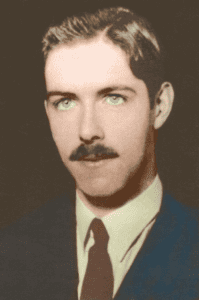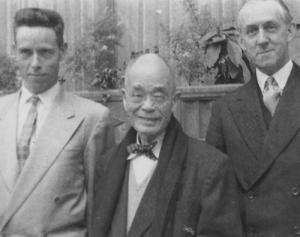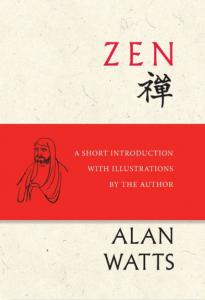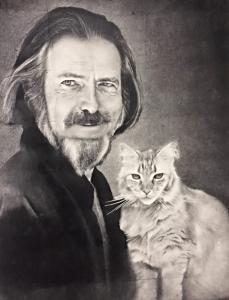One hundred and four years ago on this day, the 6th of January, 1915 Alan Wilson Watts was born in a village that is now a part of London.
Searching my blog I note I referenced him in fifty-five different postings over the past decade. This becomes my fifty-sixth revisit.
No doubt Mr Watts is an important figure in my life. And, more important I think he stands as a significant figure in the meeting of psychology and Eastern religions, as well as the introduction specifically of Zen to our popular Western imagination. For a lot of good and a lot of bad Alan Watts cannot be ignored.
In Zen Master Who? my history of Zen Buddhism come west I describe the first of the several times I met Alan Watts. It was sometime, I believe, in 1969.
“I was on the guest staff of the Zen monastery in Oakland led by Roshi Jiyu Kennett. I was enormously excited to actually meet this famous man, the great interpreter of the Zen way. Wearing my very best robes, I waited for him to show up; and waited and waited. Nearly an hour later, Watts arrived dressed in a kimono, accompanied by a fawning young woman and an equally fawning young man. It was hard not to notice his interest in the young woman who, as a monk, I was embarrassed to observe seemed not to be wearing any underwear. I was also awkwardly aware that Watts seemed intoxicated.”
What follows I’ve mostly cobbled together from earlier reflections stitched together with a few new thoughts here and there…
Alan Watts was the first person to write popular books about Zen in the West, beginning in 1937 with the Spirit of Zen, and more importantly in 1957 with his best selling Way of Zen. He drew mainly on the scholarly volumes just being written by D. T. Suzuki, the first person to write authentically about Zen in European languages, through Watts engaging style made enormously readable and genuinely compelling.
As I summarized in my history, “An erstwhile Episcopal priest, engaging raconteur, and scandalous libertine, Alan Watts was also a prolific author whose books created an inviting sense of Zen-as-pure-experience and a do-what-you-want spirituality.” These qualities both led many people to Zen while also profoundly misrepresenting what the tradition actually taught.
On that last note, some years later I attended a talk by an American Zen priest. At the end, during the question and answer period, someone asked about Watts. The priest sighed, and then said, “I know there’s a lot of controversy about Alan Watts and what he really understood about Zen.” He paused. And then, added, “But, you know, without Alan Watts, I wouldn’t be standing here on this platform.” I have to say, in large part, that’s true for me as well.
In the 1960s and 70s, Alan Watts opened some important doors for many of us looking for a new way. I’m not really sure another version, a more accurate version of Zen would have caught the popular imagination. So, messy. Kind of like life.
Over these passing years I’ve come to feel the title of his biography In My Own Way and the title of the English edition of Monica Furlong’s biography of him, Genuine Fake, taken together points to the complexities of this intriguing Anglo-American Zen trickster/ancestor of our contemporary spiritual scene.
In a relentless critique of Alan Watts, Lou Nordstrom and Richard Pilgrim point out how an authentic spirituality must encompass “practice, discipline, and effort,” features completely lacking in Alan Watts’ “Zen.” In large part I agree. But not completely. There is absolutely a place of falling away of practice, discipline, and effort. As we open our hearts we find the way is in fact broad and forgiving. And it seems he tasted that freedom and joy. I really believe he did. But, the authentic spiritual is also in that delightful conundrum of a real life, totally bound up with practice, discipline, and effort. The way is also, without a doubt, harsh and demands everything. And here Watts missed what Zen actually offers.
It’s my belief that Alan Watts was at his very best during a brief period when he tried at practice, discipline, and effort. Or, at least stood in their general neighborhood. Raised in England, his natal tradition was Anglicanism. Although he formally abandoned it by sixteen for the eclectic Buddhism of the London Buddhist Society. In his late twenties, having come to America and desperate for an occupation that paid something, he decided to become an Episcopal priest.
However, he had not attended college. For most this would be an insurmountable barrier. But by providing a very long list of the books he had read and then showing a suspicious faculty he had not only read them, but profoundly absorbed them, Watts was admitted into the divinity program at Seabury-Western Theological Seminary in Evanston, Illinois.
Watts graduated with a masters degree in divinity and was ordained an Episcopal priest in 1945. He was immediately engaged as the Episcopal chaplain at Northwestern University. He was thirty years old.
It appears to have been an amazing moment. He was wildly popular on campus, and his books were received in progressive religious circles as challenging and compelling.
Out of this period he wrote what I consider his most interesting contribution, a meeting of Christianity and the wisdoms of the East, especially Buddhism, Behold the Spirit: A Study in the Necessity of Mystical Religion.
And then within five years Watts was out of the ministry, for many reasons not least of which was when his wife sued for an annulment on grounds of adultery. This part would become something of a pattern for his life.
Another area where he did pioneering writing, and for which he gets less attention is within the meeting of Western psychology and Eastern religions, particularly Buddhism. Looking at Psychotherapy East and West, I not only found myself reading that I thought I’d discovered on my own, but that in fact Watts had pointed me toward pushing on to fifty years ago.
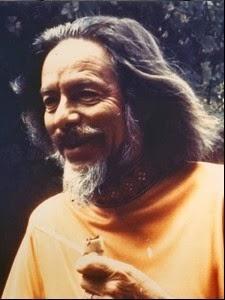 Today for those wanting to explore the depths found within the meeting of psychology and Eastern perspectives, specifically, most specifically Buddhism, there are a host of authors who’ve continued and deepened this exploration.
Today for those wanting to explore the depths found within the meeting of psychology and Eastern perspectives, specifically, most specifically Buddhism, there are a host of authors who’ve continued and deepened this exploration.
That said, Alan Watts is still worth reading, or, for some of us, re-reading. He is lucid, he is inviting, possibly he is seductive. Alan Watts’ vision of a spiritual psychology is an invitation into a world at play, where God is playing peek a boo with himself, herself, itself.
Here we’re invited into that play in the fields of the Lord.
Me, I think there’s more to the project. But, for the parts he goes for, there are few as good as Alan Watts in presenting it.


